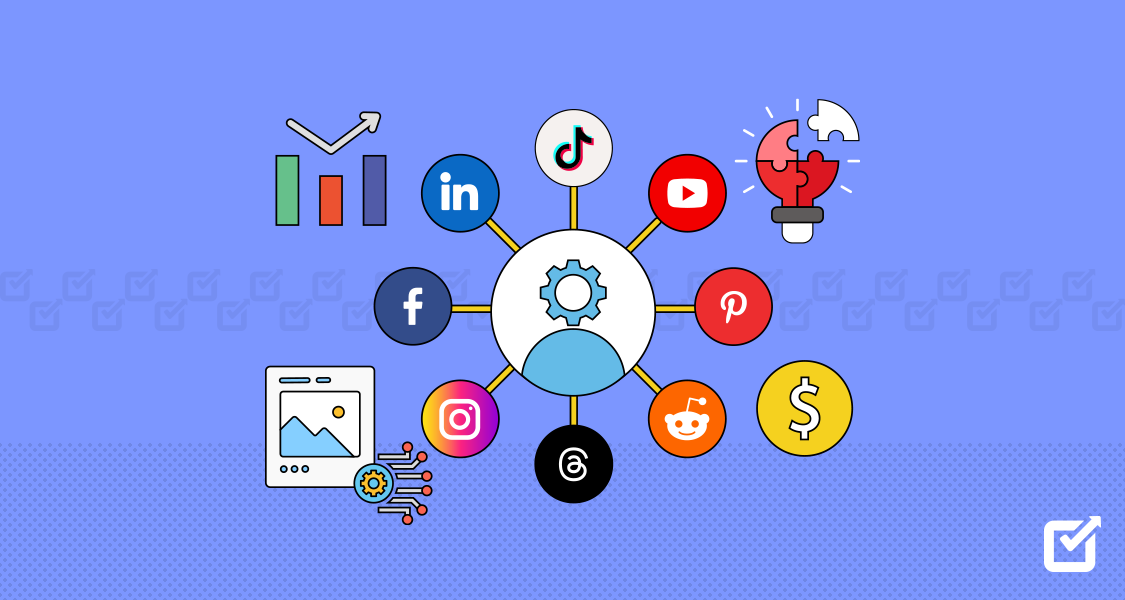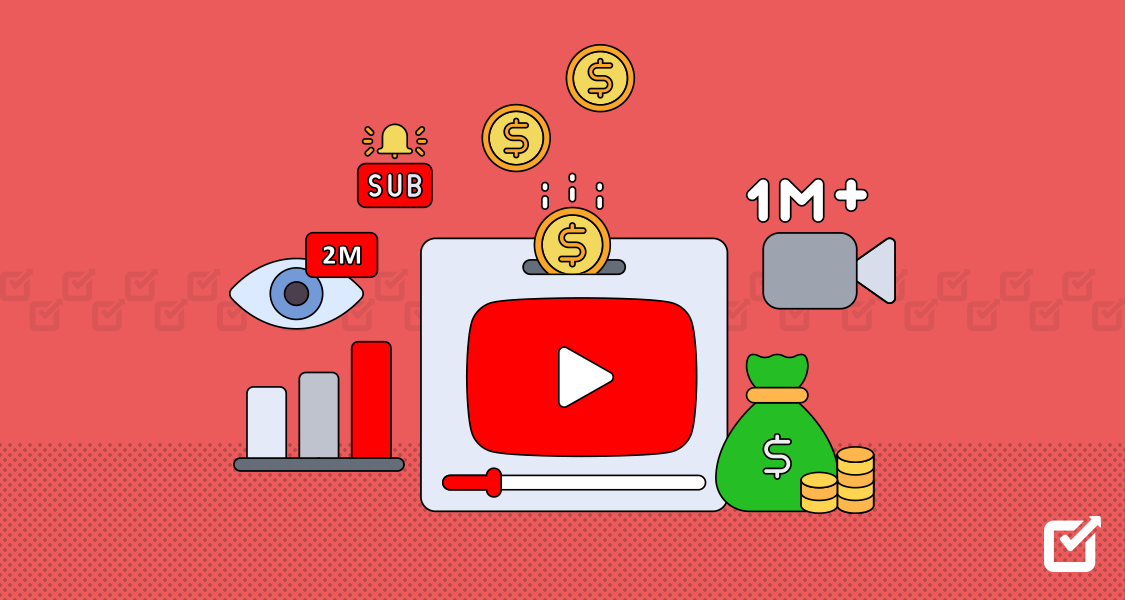Did you know that millions of social media posts are created every minute, containing a wealth of information about your target audience? Social media intelligence helps you sift through this data ocean, uncovering insights that can revolutionize your marketing strategy, product development, and even crisis communication.
Social media intelligence isn’t just about counting likes and comments; it’s a complete social media marketing package filled with helpful social media tools like analytics that help you know everything there is to improve your marketing strategy and ultimately grow your brand. So, are you ready to transform your social media presence from a noisy channel into a powerful marketing tool?
Let’s discuss social media intelligence intensely and uncover some interesting facts about it.
What Is Social Media Intelligence?
Social media intelligence revolves around collecting and analyzing data from social media platforms to gain insights into customer behavior, market trends, brand reputation, and competitor activities.
It involves monitoring conversations, tracking metrics like engagement and sentiment analysis, and using tools to extract actionable information for strategic decision-making. Social media intelligence helps businesses better understand their audience, identify opportunities, mitigate risks, and optimize their marketing efforts.
Manage Social Media Intelligently With Social Champ!
Schedule posts, organize content, track analytics, and make data-driven decisions with Social Champ!
Why Is Social Media Intelligence Important?
Social media intelligence is crucial as it offers businesses valuable insights and strategic advantages.
By monitoring and analyzing social media, businesses can better understand their audience sentiments, competitors’ activities, customer preferences, and market trends.
This intelligence empowers businesses to make informed decisions, optimize their strategies, enhance customer relationships, and ultimately achieve their business goals more effectively in the dynamic and ever-growing world of social media marketing. There are several reasons why social media intelligence is essential.
Understanding Audience Sentiments
It helps businesses gauge how their audience perceives their brand, products, or services. By monitoring conversations and sentiments, companies can identify potential issues, address customer concerns, and capitalize on positive feedback.
Social media platforms provide demographic data about the audience engaging with a business, including age, gender, location, and interests, among others. This information helps create targeted marketing campaigns and personalized content that resonates with specific audience segments.
In addition, social media intelligence reveals insights into customer behaviors, preferences, and buying patterns. Businesses can track customer interactions, engagement levels, purchase history, and content preferences to tailor their offerings and messaging.
Influencer Identification
Social media intelligence enables businesses to identify influencers and brand advocates within their target audience. Collaborating with influencers can expand brand reach, increase credibility, and drive conversions.
Companies can amplify their marketing efforts and build meaningful customer relationships by partnering with influencers who align with their values and audience.
Influencer identification is a strategic process that involves selecting the right influencers, aligning with brand objectives, and fostering authentic relationships to utilize the power of influencer marketing effectively.
By partnering with influencers who resonate with their audience and share their brand values, businesses can explore new opportunities for growth, engagement, and brand advocacy in the competitive digital world.
Real-Time Feedback Monitoring
One key reason social media intelligence is vital is its real-time feedback monitoring. Unlike traditional methods, where feedback may take days or weeks to reach a business, social media platforms offer instantaneous insights into customer sentiments, opinions, and experiences.
Monitoring social media channels allows businesses to quickly identify and address customer issues, complaints, or inquiries. This proactive approach to customer service helps resolve issues before they escalate and demonstrates a commitment to customer satisfaction.
Through real-time monitoring, businesses can gather instant insights into how the audience is receiving their products, campaigns, or brand initiatives. This data-driven approach helps refine strategies, optimize content, and make data-backed decisions to drive better results.
Measuring ROI
Social media intelligence provides valuable data for measuring social media efforts’ return on investment (ROI).
By tracking key metrics, such as conversion rates, customer acquisition costs, and revenue generated from social media campaigns, businesses can assess the effectiveness of their strategies.
This data-driven approach helps optimize resource allocation, improve campaign performance, and achieve better ROI.
Related Article: How to Set & Achieve Social Media Goals in 2024
Social Media Intelligence Tools
Social media intelligence tools play an important role in helping businesses understand and use the power of social media for marketing, customer engagement, and brand management. Let’s explore some of the top tools in this category.
Social Champ

Social Champ Social Champ is a social media management and automation platform that simplifies content scheduling, automation, analytics, and team collaboration. It offers features like bulk content scheduling, RSS feed integration, posting automation, detailed analytics, and collaborative workflows, making it an ideal choice for businesses looking to streamline their social media efforts.
Semrush

Semrush Semrush is a comprehensive digital marketing platform known for its SEO capabilities and powerful intelligence tools. With Semrush, businesses can monitor social media mentions, analyze competitor strategies, plan content calendars, and track key metrics to optimize their campaigns effectively.
Audiense

Audisense Audiense is a social intelligence platform that provides insights into audience behavior, interests, and demographics. It helps businesses better understand their target audience, create personalized content, and improve engagement through data-driven strategies.
Publer

Publer Publer is a social media management tool that focuses on scheduling, publishing, and analyzing social media content. It offers features like multi-platform posting, content recycling, analytics, and team collaboration, making it a convenient solution for managing social media presence efficiently.
Google Alerts

Google Alerts Google Alerts is a free tool that allows users to monitor mentions of specific keywords or topics across the web, including social media platforms. Businesses can set up alerts for their brand name, industry trends, competitor mentions, and more to stay informed and responsive to online conversations.
NetBase Quid

NedBase Quid NetBase Quid stands out as a robust social media intelligence tool that provides businesses with a wealth of actionable insights and analytics.
One of its key strengths lies in advanced social listening capabilities, allowing companies to monitor and analyze real-time conversations, sentiments, and trends related to their brand, products, competitors, and industry landscape.
This jump into social data enables businesses to understand customer perceptions, track sentiment trends, and proactively manage their online reputation.
Moreover, NetBase Quid offers sophisticated sentiment analysis algorithms that categorize social media mentions into positive, negative, or neutral sentiments. This feature is instrumental in accurately gauging brand sentiment, identifying potential issues or crises, and swiftly addressing them effectively.
Brandwatch

Brandwatch Brandwatch is a renowned social media intelligence analytics platform that enables businesses to monitor, analyze, and extract actionable insights from social media data.
Its core strength lies in social listening, which allows businesses to track conversations, mentions, and sentiments regarding their brand, products, competitors, and industry trends in real-time across various social media platforms.
This comprehensive view of social data allows businesses to understand customer perceptions, track sentiment shifts, and promptly address emerging issues or opportunities.
One of Brandwatch’s standout features is its advanced sentiment analysis capabilities. Using sophisticated algorithms, Brandwatch categorizes social media mentions into positive, negative, or neutral sentiments, allowing businesses to accurately gauge brand sentiment, identify potential PR crises, and proactively manage their online reputation.
Mentionlytics

Mentionlytics Mentionlytics is a social media monitoring and analytics tool that helps businesses track brand mentions, sentiment analysis, competitor activities, and influenced identification. It provides real-time alerts, detailed reports, and actionable insights to support informed decision-making in social media marketing.
These social media intelligence tools offer a range of features to monitor, analyze, and optimize social media performance, empowering businesses to build stronger relationships with their audience, stay competitive, and drive business growth.
Related Article: 20+ Best Social Media Management Tips for 2024
Social Media Intelligence vs. Social Media Monitoring vs. Social Listening
Social Media Intelligence (SMI)
Social media intelligence refers to the broader process of gathering, analyzing, and deriving actionable insights from social media data. It encompasses various activities, such as social media monitoring, listening, analysis, and reporting.
SMI goes beyond simply tracking metrics or mentions; it involves in-depth analysis to understand trends, patterns, sentiments, and customer behaviors.
Businesses use SMI to make data-driven decisions, improve marketing strategies, enhance customer engagement, and manage brand reputation effectively. SMI tools utilize advanced analytics, AI, and machine learning algorithms to provide comprehensive insights into social media data, enabling businesses to stay competitive and agile in a dynamic digital landscape.
Social Media Monitoring
Social media monitoring focuses on tracking and observing social media channels for specific keywords, mentions, or conversations related to a brand, product, industry, or topic. It involves collecting mentions, likes, shares, comments, and engagement metrics. These tremendous tools provide real-time updates and alerts, informing businesses about customer feedback, market trends, and competitor activities. While social media monitoring provides valuable data points, it primarily focuses on quantitative metrics and does not delve into deeper analysis or interpretation of the data.
Social Listening
Social listening involves a more nuanced and qualitative approach to understanding social media conversations. It goes beyond monitoring keywords or mentions to capture conversations’ context, tone, and sentiment. Social listening tools analyze language patterns, emotions, and themes within social media discussions, providing insights into customer sentiments, preferences, and perceptions.
Businesses use social listening to identify emerging trends, detect customer pain points, gather feedback, and identify opportunities for engagement or intervention. Social media intelligence software helps businesses develop more empathetic and customer-centric strategies by understanding the underlying motivations and emotions driving social media conversations.
Advantages of Social Media Intelligence
- Deeper Customer Understanding: Social media technology goes beyond basic demographics. It analyses the “why” behind customer behavior. You can uncover your audience’s needs, preferences, and hidden desires by jumping into online conversations. This allows you to develop targeted marketing campaigns and products that resonate with them.
- Data-Driven Decision Making: This intelligence provides a wealth of data that informs your social media strategy. See which content types resonate best with your audience, understand the language that gets them engaged, and track the ROI (Return on Investment) of your social media campaigns. With data as your guide, you can make informed decisions that maximize your return.
- Lead Generation: Social media intelligence helps identify potential leads through social listening, sentiment analysis, and monitoring conversations related to products or services. This enables businesses to nurture leads, convert prospects into customers, and drive sales.
- Gather Honest Insights: This intelligence gathered from social media offers the distinct advantage of gathering honest insights, providing businesses with unfiltered feedback directly from their audience. This candid feedback helps more accurately understand customer sentiments, preferences, and pain points.
By monitoring social media conversations, businesses can gain a clear perception of how their brand is perceived in the market, allowing them to identify areas for improvement and capitalize on strengths. Additionally, social media business intelligence aids in competitive analysis by tracking competitors’ activities and customer perceptions of their products or services.
Featured Article: The Ultimate Social Media Audit Guide: Steps, Tools, Platforms & Checklist
Exploring Social Media Intelligence Across Different Platforms
Social media intelligence can vary from platform to platform. When you determine which social media sites you need to gather insights from, you take another step toward a more focused marketing strategy.
Whether you’re posting on social networking sites like Facebook, microblogging sites like Twitter and Threads, or image-sharing platforms like Instagram or Pinterest, every platform runs on its specific algorithm and engagement metrics. Social media intelligence analytics tools let you dive into these valuable insights, helping you understand audience behavior, preferences, and trends.
For instance, Facebook’s algorithm prioritizes content based on user engagement, while Twitter’s real-time nature emphasizes trending topics and conversations. Meanwhile, Instagram’s algorithm focuses on visual content quality and engagement metrics like likes and comments.
Beyond these major platforms, social intelligence can also be gleaned from user-generated content across the web. This includes online product reviews, blog posts mentioning your brand, and discussions on Reddit forums.
What matters is that when working as a marketer, you need to analyze the right kind and source of social media intelligence to shape a marketing strategy that speaks to millions of people online.
What Is the Future of Social Media Intelligence
A convergence of cutting-edge technologies and evolving consumer expectations marks the future of social media intelligence. Integrating artificial intelligence (AI) and machine learning (ML) into SMI tools is one of the most significant trends shaping this future.
AI and ML algorithms will enable more sophisticated social media data analysis, sentiment analysis, trend prediction, and personalized recommendations.
This will empower businesses to extract deeper insights, understand customer behaviors more accurately, and confidently make data-driven decisions. In addition, artificial intelligence in social media is a game-changer, impacting every aspect of user experience and marketing strategies.
Real-time insights will also play a crucial role in the future of SMI. Businesses will increasingly demand real-time monitoring, alerts, and analysis to stay ahead of market trends, identify emerging opportunities, and respond promptly to customer feedback and issues.
The ability to access and act upon real-time data will become a competitive advantage in an increasingly dynamic and fast-paced digital world.
Another key aspect of the future of SMI is predictive analytics. SMI tools will develop to incorporate predictive capabilities, allowing businesses to forecast trends, customer behaviors, and market shifts.
This proactive approach will enable businesses to anticipate changes, adjust strategies accordingly, and capitalize on emerging opportunities before they fully materialize.
In Conclusion
Social media intelligence is vital to modern business strategy, offering a deep understanding of customer behavior, market trends, and competitive landscapes. With social media threat intelligence, you can interpret data from social media platforms to identify potential security threats, risks, or malicious activities.
Moreover, it also provides threat intelligence, helping you enhance your cybersecurity posture, protect your reputation, and ensure a safe and trusted online environment for your businesses and personal accounts.

















